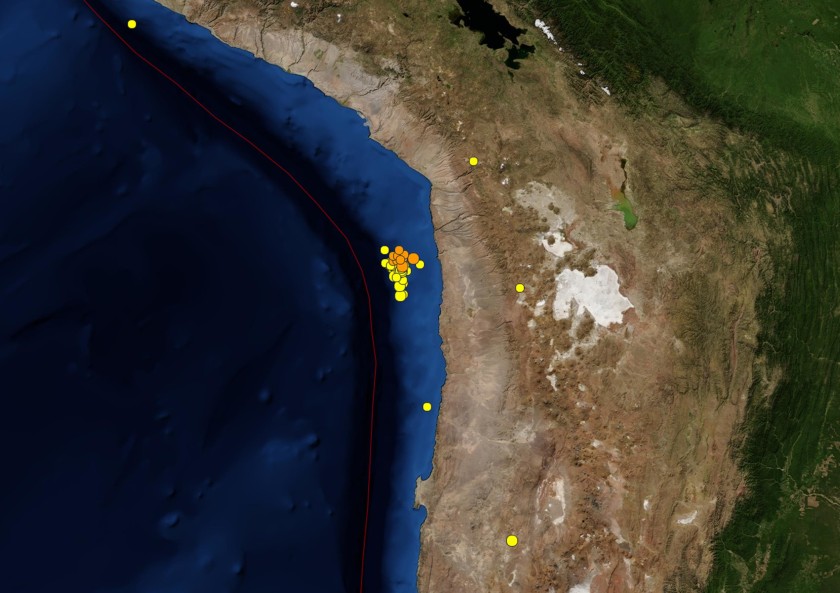Experts in Chile Fear Catastrophe as 300 Quakes Hit in One Week
Chile's
northern coast has been hit by more than 300 earthquakes in the past
week in what seismologists warned Tuesday could be the precursor to a
long-overdue disaster.
Most of
these quakes have been too small to be felt on land, but people living
near the city of Iquique have experienced the rumbling of up to a dozen
tremors per day.
Experts analyzing this
flood of data are worried the increased seismic activity could be a sign
the region is about to experience its first devastating quake in 137
years. The last event, a magnitude-8.5 quake in 1877, killed thousands of people and created a deadly tsunami that reached Hawaii and Japan.
"It
is very unusual activity and we are trying to find out what is causing
it," said Mario Pardo, deputy head of the seismology center at the
University of Chile.

USGS
"We usually get around 10
earthquakes per day in this area [many of them very small], but now we
have been getting up to 100 per day," he told NBC News via telephone
from the country's capital Tuesday.
Pardo
told NBC News that seismologists are particularly concerned about this
cluster of quakes because press reports following the 1877 event said
there was a similar "swarm" of tremors beforehand.
"We
have been waiting for a big one in this area for some time - this is a
place where we are expecting an earthquake of over 8.5 magnitude," he
said.
Paulina Gonzalez, an
expert at the University of Santiago, backed up this analysis. "The
latest string of quakes is noteworthy because the last one happened in
this seismic zone more than 130 years ago. It's a zone where quakes
should happen more often, and they haven’t in a very long time," she
told The Associated Press.
"A big earthquake could strike in a number of years or it could strike sooner - the only thing we can be certain of is that it will strike."
The United States Geological Survey (USGS) said its own analysis showed that in the past seven days there had been 41 quakes in the area stronger than magnitude 4.5.
Janan
Purstey, a geophysicist at the National Earthquake Information Center,
part of the USGS in Denver, said seismologists in Chile would be better
placed than anyone to assess the threat of the current activity.
Chile
is one of the world's most earthquake-prone countries, with its
2,500-mile coastline tracing where the Nazca tectonic plate meets the
South American plate.
In 1960 it
was hit by the largest earthquake ever recorded: The Valdivia
earthquake, also known as the Great Chilean Earthquake, was a
catastrophic magnitude-9.5 event that killed up to 6,000 people and
created an 80-foot tsunami that reached as far as Hong Kong.

ALEJANDRO MORENA ASEGURA / AP, file
But this, along with a
magnitude-8.8 earthquake in 2010, hit much farther south than the region
affected by the current cluster. The major worry for northern Chile is
that the 1877 quake created what is known as a seismic gap - a fault
line likely to produce earthquakes because it has been quiet for some
time.
The recent northern flurry
began on March 16 with a magnitude-6.7 tremor off of Iquique, home to
180,000 people. People living in low-lying areas evacuated their homes
to higher ground (shown in the full-bleed image above) but no tsunami
materialized.
Since then, Pardo
and his peers have seen the needles on their seismographs barely take a
rest. They are still unsure of what it means, but they have given a
series of hypothetical situations to state and government officials.
"We
are working with all our authorities and they now have immediate access
to our information in real time," he said. "We just want to make sure
people are prepared."
"A big
earthquake could strike in a number of years or it could strike sooner,"
he added. "The only thing we can be certain of is that it will strike."
The Associated Press contributed to this report.
No comments:
Post a Comment
Please leave a comment-- or suggestions, particularly of topics and places you'd like to see covered